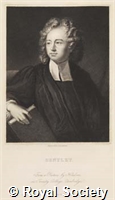| Authorised form of name | Bentley; Richard (1662 - 1742); philologist and scholar |
| Dates | 1662 - 1742 |
| Nationality | British |
| Place of birth | Oulton, parish of Rothwell, West Riding of Yorkshire, England, Europe |
| Date of birth | 27 January 1662 |
| Place of death | Trinity College, Cambridge, England, United Kingdom, Europe |
| Date of death | 14 July 1742 |
| DatesAndPlaces | Baptism:
Rothwell, West Riding of Yorkshire, England, Europe (6 February 1662)
Burial:
The chapel of Trinity College, Cambridge, England, United Kingdom, Europe |
| Occupation | Clergyman, Church of England |
| Activity | Education:
Queen Elizabeth Grammar School, Wakefield; St John's College, Cambridge (BA 1679/80; MA 1683; DD 1696); incorporated at Oxford (1689)
Career:
Ordained deacon (1689/90), priest (1692); Master of Spalding School (1682-1683); Tutor and Chaplain to Bishop Stillingfleet's family (1683-1695); Boyle Lecturer (1692); Prebendary of Worcester (1692); Keeper of the Royal Libraries (1695); Chaplain to the King (1695); Archdeacon of Ely (1701); Master of Trinity College, Cambridge (1699/1700-1742) during which time he was involved in almost incessant disputes with the Fellows; Regius Professor of Divinity (1717-1742); Deprived of his degrees by the University (1718-1724) |
| Membership category | Fellow |
| Date of election | 30/11/1695 |
| Age at election | 33 |
| RSActivity | Royal Society roles:
Council 1697 |
| Relationships | Parents: Thomas Bentley and Sarah Willie
Married: Joanna Bernard
Children: Richard Bentley; Elizabeth Favell (née Bentley); Joanna Bentley |
| PublishedWorks | https://www.worldcat.org/identities/lccn-n50007421/ |
| OtherInfo | Bentley was particularly influential in the development of the English school of Hellenism. In his work 'Dissertation upon the Epistles of Phalaris' (1698), he proved that the letters in question were falsely attributed to the tyrant of Agrigento in Sicily, Phalaris. In his time as Master of Trinity College, he commenced significant building projects, including on an observatory for Roger Cotes (FRS 1711) and a laboratory for chemistry professor, Giovanni Francis Vigani. At his death, his estate was worth around £5,000 and he also bequeathed some Greek manuscripts to the Trinity College Library. Most of his collections and papers are now with the British Museum collections.
Bentley did, however, claim in his journals to have lost around £4,000 in 'the South Seas' and it is likely he refers to the so-called South Sea Bubble. The South Sea Company was founded in 1711 and was granted a monopoly on trading enslaved Africans. The stock steadily rose in price while no signficant profit was made and then collapsed in 1720, ruining thousands of investors. The Company survived and between 1715 and 1731 profited from the sale of over 60,000 enslaved Africans. |
| Related images | Discover a selection of related images in our picture library |
| Image | 
|
| Source | Sources:
Bulloch's Roll; DNB; Venn; Hunter; Foster; ODNB
References:
Allibone, T E. 1965. 'The Diaries of John Byrom, MA, FRS, and their Relation to the Pre-history of the Royal Society Club', in Notes and Records, vol. 20, pp. 162-183
Cohen, I Bernard. 1964. '"Quantum in se est": Newton's Concept of Inertia in Relation to Descartes and Lucretius', in Notes and Records, vol. 19, pp. 131-155
Glyn, L B. 2002. 'Israel Lyons: a short but starry career. The life of an eighteenth-century Jewish botanist and astronomer', in Notes and Records, vol. 56, pp. 275-305
Hunter, M C W. 1989. 'The Crown, the Public and the New Science, 1689-1702', in Notes and Records, vol. 43, pp. 99-116
Munby, A N L. 1953. 'The Keynes Collection of the Works of Sir Isaac Newton at King's College, Cambridge', in Notes and Records, vol. 10, pp. 40-50
Munby, A N L. 1953. 'The Distribution of the First Edition of Newton's Principia', in Notes and Records, vol. 10, pp 28-39
Whitrow, G J. 1989. 'Newton's Role in the History of Mathematics', in Notes and Records, vol. 43, pp. 71-92 |
| Virtual International Authority File | http://viaf.org/viaf/27862472 |
| Code | NA8038 |